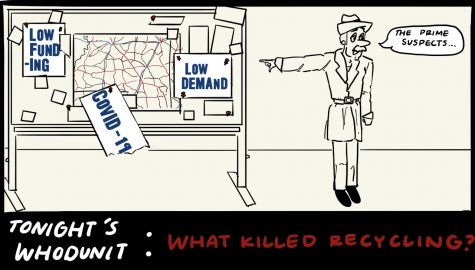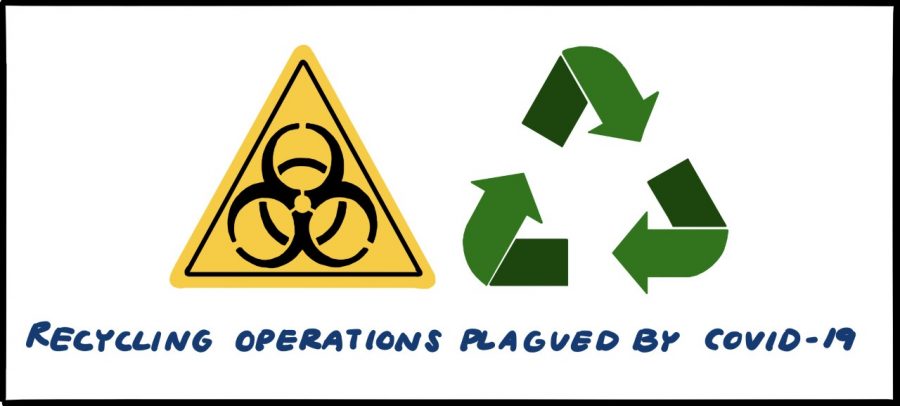The COVID-19 crisis has made it difficult for towns such as Starkville to continue initiatives like recycling, especially since there is little demand.
Yan: Starkville needs green solutions
Reduce, Reuse, Recycle. The three R’s slogan was first introduced around 1976 after the Resource Conservation and Recovery Act was passed, which promoted recycling and conservation efforts as waste became a tremendous concern in the United States. For many decades, this slogan exists as a constant reminder to us that recycling is an important asset to protecting our planet. However, this message has significantly changed over the years, most notably during the COVID-19 pandemic. Right now, cities are cutting recycling programs left and right. But what are they replacing it with to fill the shoes of such an important program? The answer is nonexistent, which is why we, the leaders of the next generation, have the responsibility to take on the challenge of finding a new program that promotes conservation.
From childhood, we were taught that in order for us to keep our world as clean as possible, we need to recycle. We were told that recycling is what will change our future for the better. But it seems as though after many years, in what is now believed to be a new era, this idea is rapidly changing, right beside our mailbox. Especially now, when we are in the middle of a pandemic, these adjustments to the ideas of conservation become even more noticeable.
Recently, the City of Starkville decided to suspend its recycling program beginning Thursday, Oct. 1, in the midst of a pandemic. The reason? Lack of market demand and budget due to COVID-19. The city’s administration explained that the reason for this suspension was because of the detrimental impacts the pandemic brought as it caused the city to quickly lose grant money to support the program. In addition, The Dispatch noted that the demand for recycling has greatly diminished throughout recent years, with only around 10% of Starkville residents signing up to recycle. Therefore, the need for a recycling program in Starkville starts to disappear.
The decision for Starkville to move forward with this decision affected many current Starkville residents, like junior Lyem Ningthou.
“When I heard that they [Starkville officials] were canceling the recycling program, I was disappointed. While it cost my family around $5 a month for recycling, I always felt the importance of doing my part in recycling to better the environment. But because it’s gone, I’m unsure of how to help out in my community now,” Ningthou said.
While the need for recycling programs and other plans to promote a sustainable environment remains evident, lack of funding for such programs can only hinder the continuation of such a program, which is why junior and Starkville native Amy Zhang agrees on the idea of suspending recycling programs to an extent.
“It’s unfortunate that these programs have ended because of the environmental responsibility cities should have, but it makes sense that they’re ending it if they don’t have the money to keep it,” Zhang said.
Senior and Starkville native Aaron Wan also understands the perspective of what the city is looking at this suspension from. While the city simply can not support the program any longer, the lack of market demand for such a program also prevents further maintenance.
Wan explains, “Obviously, recycling is important. But if there was literally no market for recycling, that means that the trash isn’t getting turned into new goods, so it’s not even, in turn, benefiting the environment.”
Similarly, in 2019, the City of Jackson suspended its own recycling program beginning Sept. 1. However, this was obviously not caused by the current pandemic — rather, the city suspended the program simply because the market demand for recycling decreased.

Although limited demand over the years is expected to suspend these programs, we must also look at this from another angle. Even if cities suspend recycling programs due to decreased demand, what alternatives are cities like Starkville currently providing to promote sustainability? Nothing. No matter how rural or populated a city is, cities have a role to present new options to further encourage other individuals to maintain a clean environment.
MSMS junior Dalton Rainer expressed his thoughts on the suspension of recycling programs, mentioning how newer and more effective actions are needed to bring about a noticeable change in such a time like this.
“When I think of city programs to introduce recycling to a community, or really any environmental effort for that matter, the first thing I hear in my head is ‘jobs, jobs, jobs.’ It’s good because it increases environmental consciousness within a community, but it must also be said that recycling alone isn’t enough to curb the global issue of climate change,” Rainer explained. “If Earth gets too hot to sustain life then any benefits to the economy, public consciousness or environment would render obsolete, so while recycling programs are important, much more radical measures must be implemented for any real, substantive change to occur.”
Suspending recycling programs due to lack of grant and demand is justified, but not introducing alternative solutions for communities to protect the environment is unreasonable. What’s the explanation for suspending recycling programs if we have no other program to back it up? How is this going to help our fight against the degradation of natural environments? This is why we must continue to promote change, to find greener alternatives to tackle the environmental issues we presently face. Even if people lose such programs, there should always be a backup plan of action. In fact, cities and communities should provide various plans for when recycling programs are suspended. For example, promoting the idea of personal composting and recycling through social media, newspapers or even through discussions is enough to at least inform people on what they can do to help out.
There is also a need to explore the latest ideas that can replace recycling programs with another economically viable and eco-friendly program. Especially in the time that we live in right now, we are constantly experiencing a changing climate, pollution and loss of biodiversity, which throws off our ecological balance. Thus, it becomes inherently important to educate the next generation of leaders on the topic of environmental sustainability.
While it’s still relevant to follow the three R’s slogan, we need innovative ways to combat current environmental issues. Because recycling has been around for quite some time now, it makes sense that we would need new, technologically advanced approaches by now to replace recycling programs. We have to adapt to our time by shifting the standards of how we promote a clean, long-lasting environment. Even during a pandemic, we must continue to inform others about the importance of reducing waste, reusing items and recycling materials. These changes will not happen on their own; we have the duty to sustain the world we are living on. Every positive improvement we make is a change for the better, and we are the ones who will impact how our environment will look in the future.
If cities are suspending recycling programs due to lack of demand or money, there should always be another program in hand to continue the message of conservation. Since we are in such a technology-dependent era where everything we see is rapidly changing, a new set of challenges we face will require modern approaches, beginning from amongst ourselves. Just like how many cities and people may view recycling as old-fashioned, outdated or even useless, what is the next best thing that will replace recycling programs? That is what we, as the next generation, are here for: to find the answers to current problems. Be the change because we are the future.
